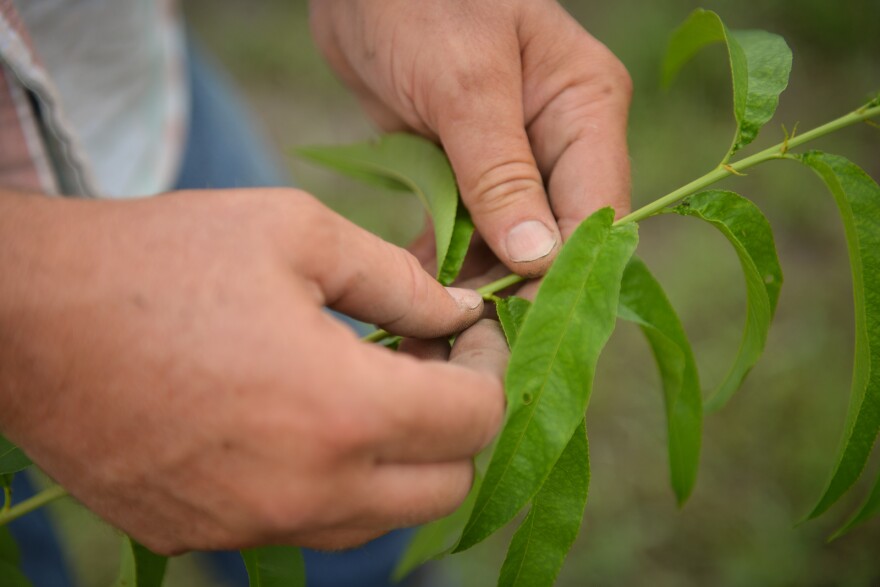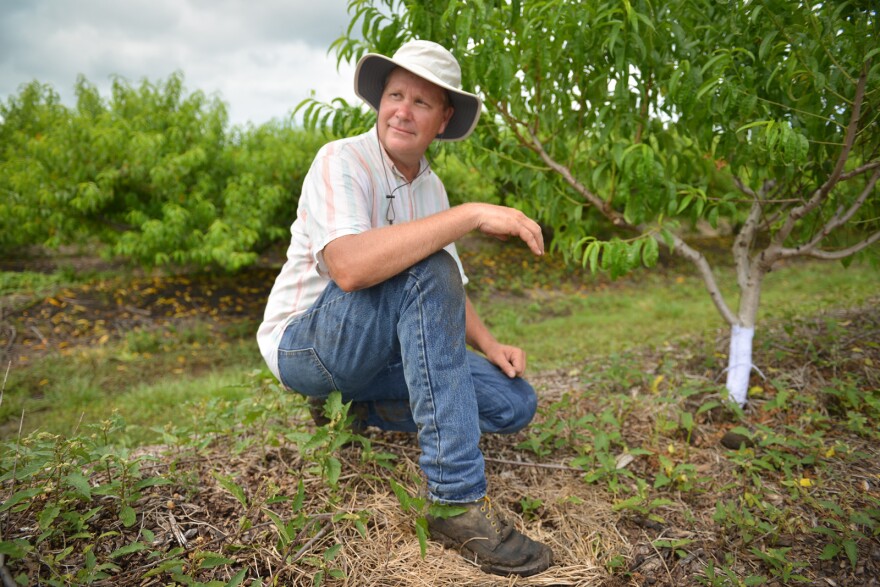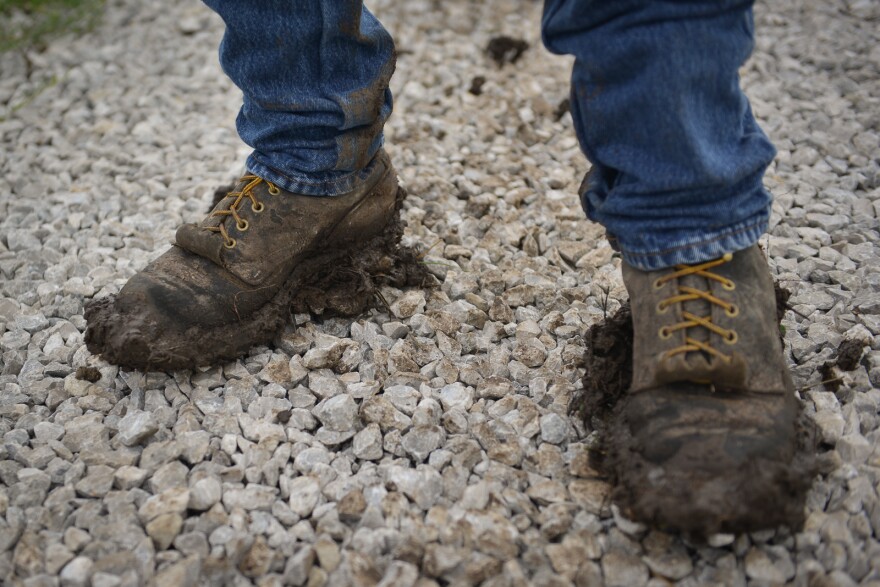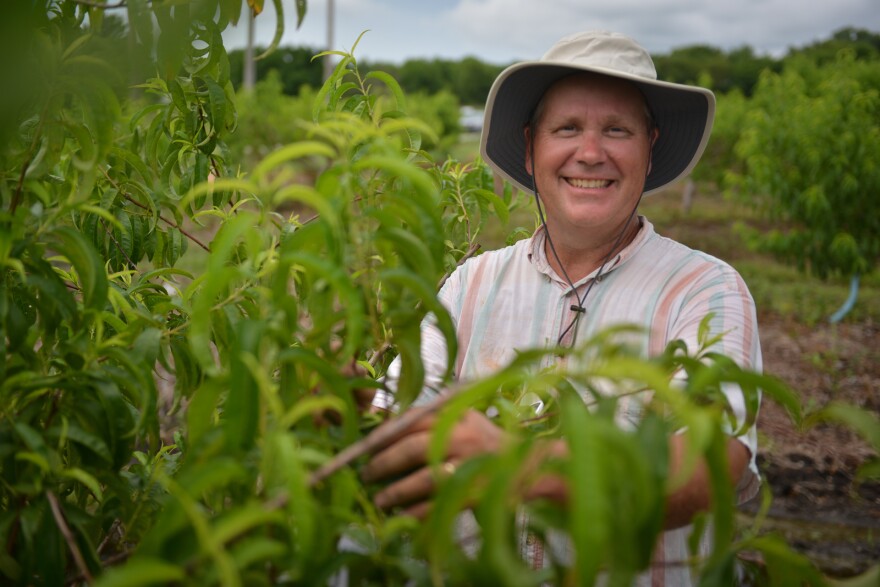For more stories like this one, subscribe to Real Humans on Apple Podcasts or Spotify.
Earlier this week, I drove down Missouri's State Route D, about a half hour south of Kansas City, through a deluge of rain—sturdy boots in tow, anticipating mud. My plan was to pick cherries at Tubby Fruits Peach Orchard in Cleveland, Missouri, but I also hoped, in a way, to reset.
I haven't fully shaken the 15 months of white-knuckle endurance this past year has demanded, and I suspect I'm not alone. After spending so much time in survival mode, moving forward again with purpose is strangely unfamiliar. And with the pandemic not entirely over yet, those first steps feel not just clumsy, but uncertain.
I went to the orchard thinking a simple story about seasonal fruit would cleanse my palate. Worst case scenario, I'd return home equipped to bake pie. Instead, I found a way to think differently about getting un-stuck.
Mark Angermayer greeted me as I trudged across his gravel lot, the rain mostly cleared. He runs what began as a peach orchard, although you won't find any peaches there this year. That's not uncommon: This far north in Missouri, peaches only survive warmer winters. And that's not the kind of winter we had.
"I knew when we got to 17 below, it was just too cold," Angermayer says with an accepting shrug.

The orchard boasts 550 peach trees, but for obvious reasons, Angermayer's diversified his crop. About 45 cherry trees bore red fruit when I arrived, although not for long, since cherry season is wrapping up now. Next up, blackberries. Then tomatoes and corn.
A lifelong farmer, Angermayer didn't get into fruit until the last decade. He started out as a pig farmer, dependent on physical strength to handle equipment and manage live animals. When he injured his back in the field, that strength failed him.
At first, Angerayer limped and winced through the pain.
"There was all this work that needed done," he remembers. "I just felt like I kept having to go, go, go... and pushing myself every day took it to where I had to bite my cheek just to walk."
When Angermayer finally stopped working long enough to rest, he couldn't get back up. Standing was hard, sitting was harder. Working the hog farm was impossible.
Angermayer sold his half of the business to his partner, then spent a year and a half in bed, believing he would never work again.
"When you're hurting that bad and you've lost your health and your dream and your occupation, you don't have any hope," he tells me. "It's hard to even start dreaming again."
Angermayer says he slept only about two hours a night, for what seemed like an eternity—spending the days waiting for night and the nights waiting for day. He couldn't eat; at 6'3", he dropped to 135 pounds.
"So that's kind of the place I was at," Angermayer says.
His family moved to Kansas City, where his wife found a job to support them. Eventually, Angermayer underwent surgery to put titanium rods in his back. He slowly began to move again, gaining enough strength to sometimes watch his small children.
That's when his wife bought him a couple of peach trees from Walmart. Angermayer says she did so as a kind of therapy, because she knew something essential and true about him.
"She knew I was a farmer," he says.
"There's a cliché about farming, and I hate to say it because it is a cliché," Angermayer confesses. "And that is, it's not an occupation, it's who you are. And that certainly is true. It gives me a lot of satisfaction and meaning in life that I'm providing one of the most basic necessities of life, and that is food."

Angermayer's wife planted the trees herself, because he still couldn't. That was in 2009.
"I just started getting really interested in them and started kind of tending them a little bit, thinking, 'I can get out there a little bit,'" he remembers. "And so it started to give me kind of, I guess, a sense of purpose again."
A few trees became a few more trees, and Angermayer got healthier and healthier, until the family had more peaches growing outside their house than they could eat or give away.
In 2011, they bought 20 acres of land in Cleveland, Missouri, which became Tubby Fruits Peach Orchard. It's now a business with hundreds of trees and loyal customers who come to pick their own fresh fruit every year.
The only crop customers can't pick themselves is the round peach; it's too delicate. Pull on one peach, and five might come tumbling onto the ground.
Angermayer's "new normal" didn't fall into place overnight. He endured a long learning curve.
"The first peach trees I put in at the house, for instance, I didn't know that that around here, the ground is just too wet for peaches to thrive when they're just planted in flat ground," he says.
Angermayer finally realized he needed to build rows of mounds that let the water drain away from the tree roots. Before that breakthrough, he spent a lot of time hauling dead peach trees to his truck.
Angermayer also learned not to ignore pain, like he used to.
"Summer before last, it was a real good summer for peaches, and I was hauling these lugs of peaches around, and my backs just started killing me," he says.
He'd hired an assistant on the farm, so he offloaded the heavy lifting and sat out front to chat up the customers. "I probably looked like I was pretty lazy, but you know, I just I've learned that if it, if it starts hurting too bad, I just have to quit."

Looking over the expanse of healthy fruit trees on this orchard feels spiritual.
If Angermayer had stayed in bed trying to mastermind the perfect fix to his problems, he may never have gotten up. A couple of trees brought him joy, so he did what he could to nurture them. Those first, imperfect steps got him dreaming again, not the other way around.
I tell Angermayer about his guru status, and he laughs.
"I will say this," Angermayer replies. "It kind of makes me feel good. Some mornings or evenings, I'll just go up to that top gate and look out over and see all that we've planted. And there's a certain sense of satisfaction that I'm growing a lot of food for a lot of people."
Angermayer hands me a bucket lined with a plastic sack, and sends me off to pick my cherries. They're tart cherries that pack a slight pucker; sweet cherries are hard to grow in this region, even more so than peaches.
Here, tart cherries thrive. Having never tried one before, I expect them to require a lot of sugar and butter and baking to taste halfway decent. When I arrive home with my cherries, I give one a try.
Sure enough, they probably could use a little sugar. But I don't really mind the sour.
Tasting one cherry makes me reach for another. I start taking inventory of tins and ingredients to see what can be done with them. I have lots of ideas. Time to get baking.







